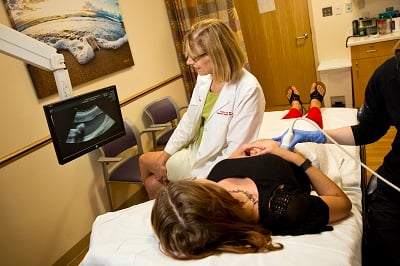

Our advanced diagnostic tools in the Zickler Family Prenatal Pediatrics Institute identify your baby’s condition and ensure your baby has the best possible start in life.

Fetal Imaging
Fetal Magnetic Resonance Imaging
In using Fetal Magnetic Resonance Imaging (MRI), our goal is to treat the fetus as a separate and individual patient. With detailed images of your baby’s internal organs and structures, we are able to understand how health issues affect well-being in utero and determine when and if intervention may be possible.
Fetal Ultrasound
Fetal ultrasound is a routine, painless test that provides general information about the growth of your baby and the structure and function of the baby’s organs. This test may be performed in the following ways:
- Abdominal ultrasound. Gel is applied to the mother’s abdomen and the ultrasound transducer glides over the gel on the abdomen to create the image.
- Transvaginal ultrasound. A smaller ultrasound transducer is inserted into the mother’s vagina and rests against the back of the vagina to create an image. This produces a sharper image than abdominal ultrasound and is often used in early pregnancy.

Medical In Utero Interventions
Medical in utero interventions include drug management of life-threatening fetal arrhythmias and treatment of heart failure. Rhythm abnormalities most often are diagnosed initially by the obstetrician. In many cases the abnormal heart beats are intermittent and do not endanger the baby’s overall health.
However, in some cases the heart can beat too fast or too slow and this can lead to heart failure and prenatal distress. In these instances, we recommend an urgent evaluation by a prenatal cardiologist.
In many cases, these life-threatening fetal arrhythmias or fetal heart failure can be treated by delivering medicine to the fetus by giving it to the mother. Our approach to this care utilizes the skills and expertise of both the high-risk obstetrician and the prenatal cardiologist.
We're Here to Answer Your Questions
If you have questions or need more information about the Zickler Family Prenatal Pediatrics Institute, please call 202-476-7409 or email us.






